Types of containers for growing autoflowering cannabis
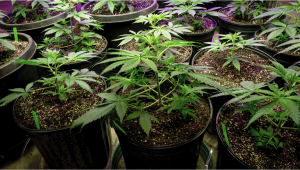
- 1. What should you look for in a pot?
- 2. Store-bought pots
- 2. a. Plastic containers
- 2. b. Clay containers
- 2. c. Cement containers
- 2. d. Smart pots
- 2. e. Air pots
- 3. Improvised pots
- 3. a. Paint buckets
- 3. b. Bottles
- 3. c. Glass containers
- 4. What should you have in mind when buying pots?
- 5. Best pot for autoflowers
- 5. a. The best options for autoflowers
- 5. b. The perfect pot size for autoflowering strains
- 6. In conclusion
Pots are widely available in all shapes, sizes, and materials, even though they may not seem that important, the roots grow in it and are shaped by their form. When talking about autoflowers, it’s essential you choose a good pot that provides enough oxygen to the roots because autos have a limited life cycle, so you should try to make their growth go as smoothly as possible.
1. What should you look for in a pot?
As you’ve no doubt noticed while strolling through the woods or walking alongside a hedgerow, plants don’t grow in pots out in nature—these vessels are a strictly artificial environment. They come with an array of benefits; they make plants portable, they dictate plant size, and they make it possible to grow indoors, as well as outdoors on surfaces such as concrete. However, these benefits come at a slight cost. Growers need to manage their potted plants correctly. Several issues can begin to rear their heads during the growing process, including overwatering and underwatering, poor aeration, compact soil, and a lack of microbial diversity. Below, we’re going to guide you through what to look for in a pot to get the best results when growing autoflowering cannabis cultivars.
Before buying anything, it’s important you know what the roots need to grow healthy and strong. Just like all other plants, cannabis roots need oxygen and water to thrive. One of the functions of the roots is to breathe, the roots contain tiny pores named stomata (just like the ones on fan leaves) which are responsible for the air exchange between the atmosphere and the air in the pots, absorbing oxygen and transporting it to the rest of the plant. Similar to the way roots absorb oxygen, they also absorb water by osmosis, root cells are adapted for taking up water and nutrients, that’s why they develop the way they do, by covering a large surface they can ultimately absorb more water.
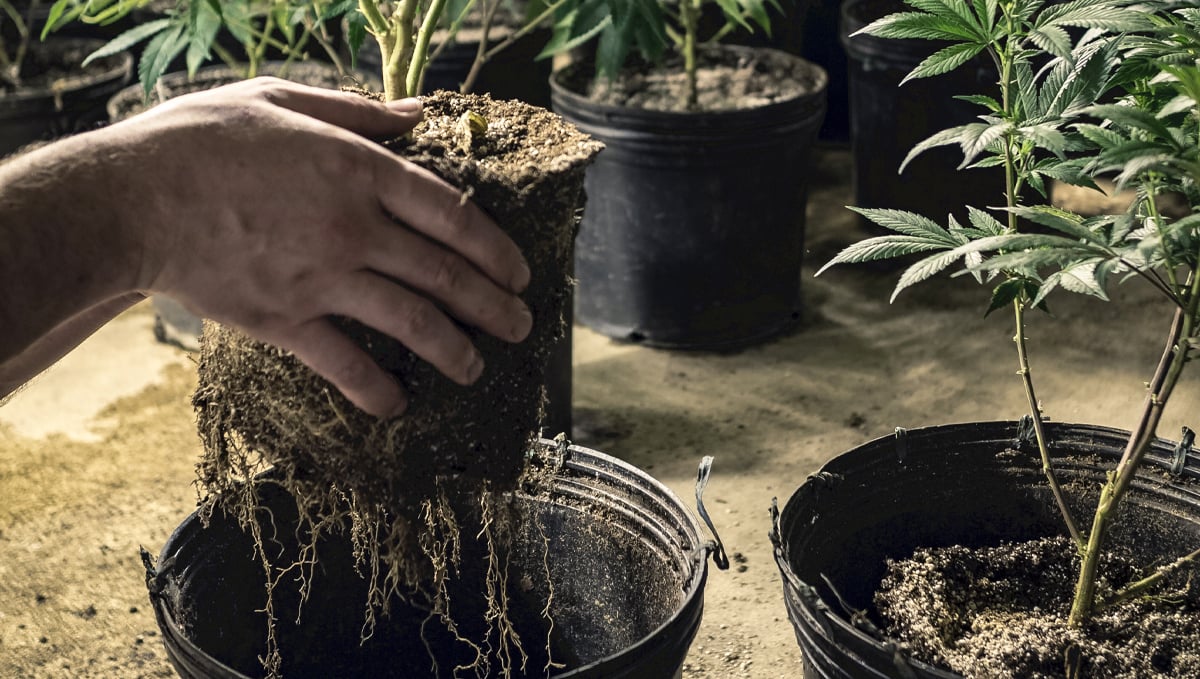
As you may know, these two elements are vital for plant growth but in excess can kill your plant. Too much water either by overwatering or by lack of drainage can drown your plants and this applies to oxygen too, if the soil contains a lot of oxygen the roots will have problems absorbing water and may end up dead. Choosing the best pot, which should have a balance of good drainage and aeration is essential when growing any kind of plant and especially when growing autos. You should also consider the size of your pot. Autos grown in small containers won’t grow very big. Likewise, those grown in large pots will fulfill their genetic potential and become larger. If you’re trying to remain as stealthy as possible, or you’re dealing with very limited space, a small pot can help to facilitate a micro grow. If you want to raise the biggest and most productive specimens possible, opt for larger containers.
| How it's absorbed | Why it's needed | How it's used | |
|---|---|---|---|
| Oxygen | Roots release CO2 and absorb oxygen through the stomata. | Roots breathe for the plants' cells to produce energy and continue growing. | Oxygen is used in the process of photosynthesis where CO2 to produce sugar. |
| Water | Roots absorb water by osmosis and the nutrients in it will travel to your plant. | Minerals are needed to develop the leaves and fatten up the buds. | Nutrients are used in photosynthesis along with oxygen to promote growth. |
Have in mind that the amount of water your plant needs may vary from strain to strain and plant to plant but all plants (not only cannabis) need water and oxygen to be able to continue their processes which allows them to grow healthy.
2. Store-bought pots
Store-bought pots are all the pots that you can easily find in grow-shops or florists. There are innumerous types of pots that will fit well, depending on where and how you’re growing.
Plastic containers
Plastic containers are the standard you can find anywhere, they are usually very cheap and easy to use. When using plastic containers you have to be careful because using a small pot can make the roots stick together and your autos can eventually become root-bound. Make sure they provide enough drainage, your plastic containers should have holes in the bottom to allow the water to drain, if they don’t have them you can easily make them yourself, this will prevent avoid the roots from drowning.
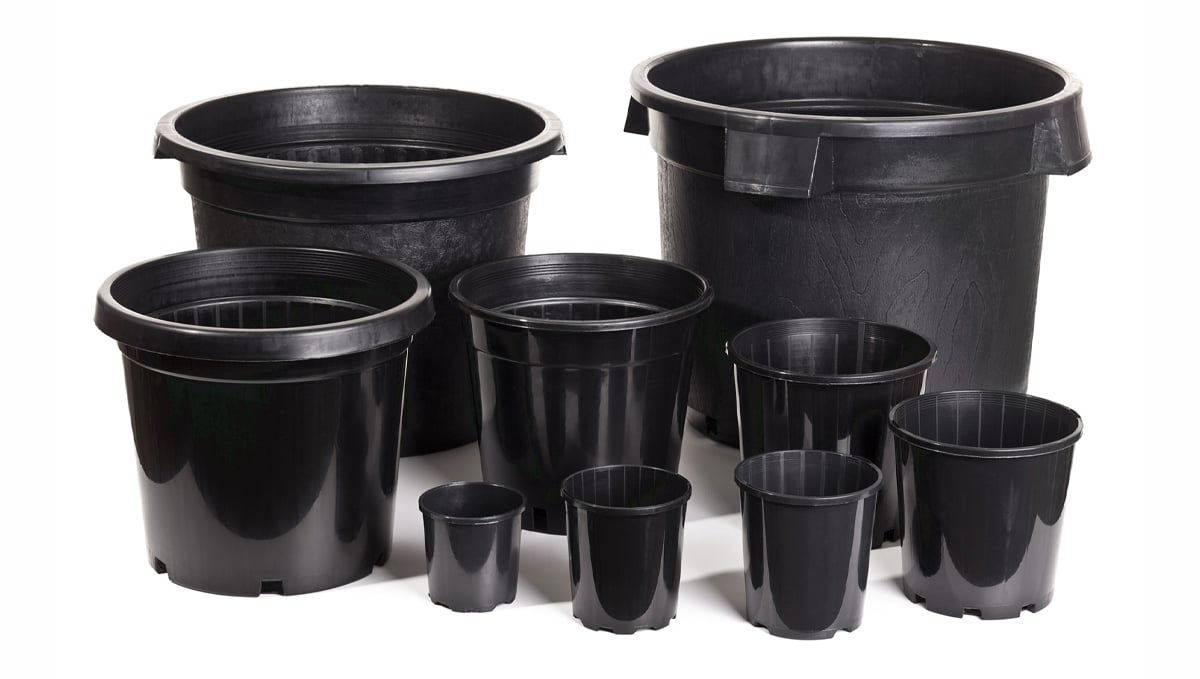
You can successfully grow your autos in 5-12L pots, depending on the specific strain and the space you have, usually, if you’re growing indoors it’s a good idea to have a small plate in the bottom to help catch the water that comes out of the pot when watering. Plastic containers offer growers a suite of advantages, Whereas some models are weak and flimsy, those crafted from strong and sturdy plastic will last you many growing seasons. While these containers lack the aeration provided by other options, they offer superior moisture retention which means you won’t have to hydrate your plants as frequently.
Of course, as will all things, plastic pots also have their downsides. They tend to hold heat (especially black ones) which can become problematic in hot growing environments. Here, the benefits of water retention are lost to environmental extremes that cause excess evaporation.
Clay containers
Clay (or ceramic) pots are also available widely but are usually found in bigger sizes and are relatively more expensive than plastic containers for example, although more expensive does not mean they're better, at least for growing cannabis.
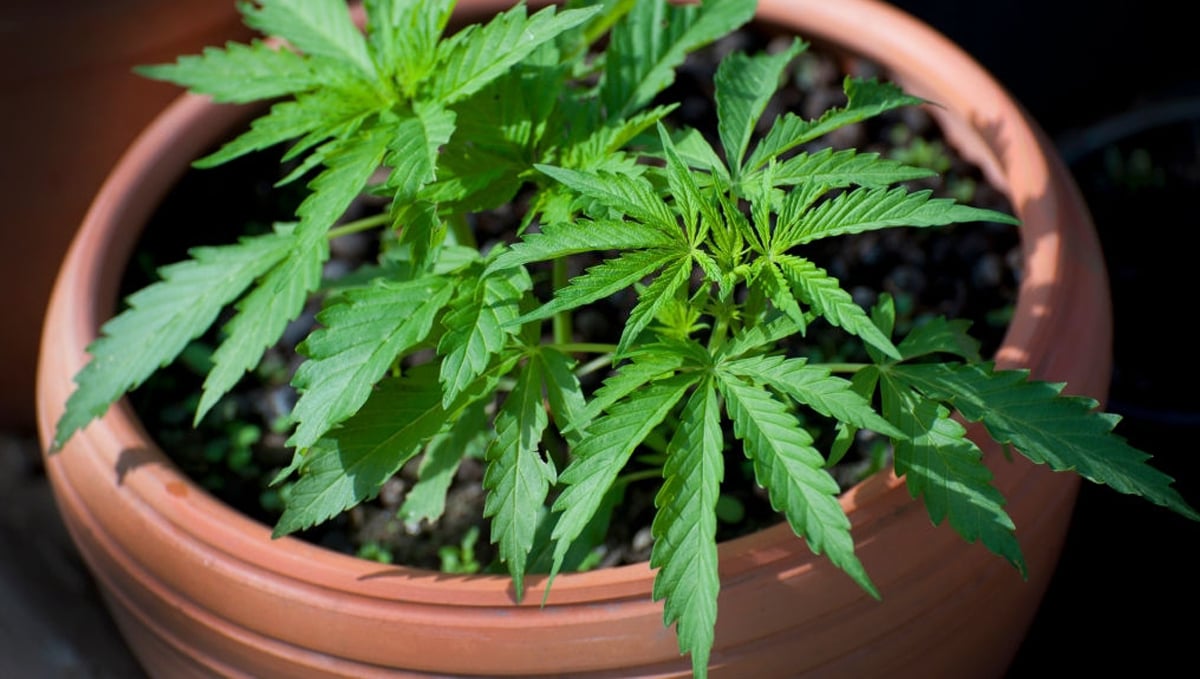
Depending on where you live, clay pots can be a good idea because they help absorb the excess moisture while still keeping the medium damp but may not be the best choice for indoor growers.
Because they’re quite heavy, it can be difficult to move them around so if you’re planning on using clay pots it would be better to use other types of containers.
Cement containers
Cement pots are similar to clay pots but can be a bit cheaper, they are also a bit sturdier and can last for a long time but just like clay pots, cement pots are heavy by themselves and when you have your medium of choice and a plant in it, can be super heavy.
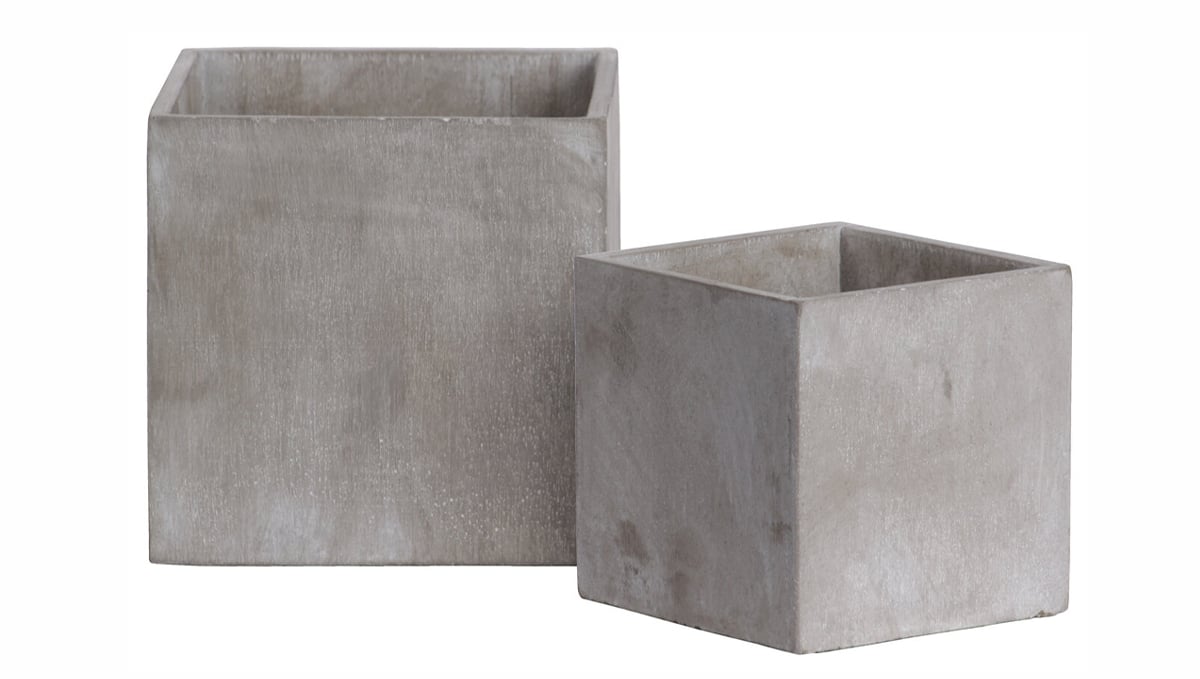
We recommend cement pots if you have it readily available but it’s better to go for plastic containers if you can. Cement containers are usually recommended for plants that last years and years, that is not the case with cannabis plants. Many cannabis cultivators choose to grow in containers because they make plants mobile. If it’s raining close to harvest time, or high winds are approaching, you can simply pick up your plant and move them to a sheltered spot. You can move cement pots, but they make this job a lot more difficult due to their weight.
Smart pots
Smart Pots are the latest product in the container world, smart pots are made out of fabric and provide a lot of oxygenation to the roots, which will help them grow better, ultimately resulting in a healthier plant. Unlike plastic containers, for example, you won’t have to worry about drainage, smart pots basically prevent the roots from becoming root-bound because if they outgrow the pot they can still grow outside of it, although this is not ideal.
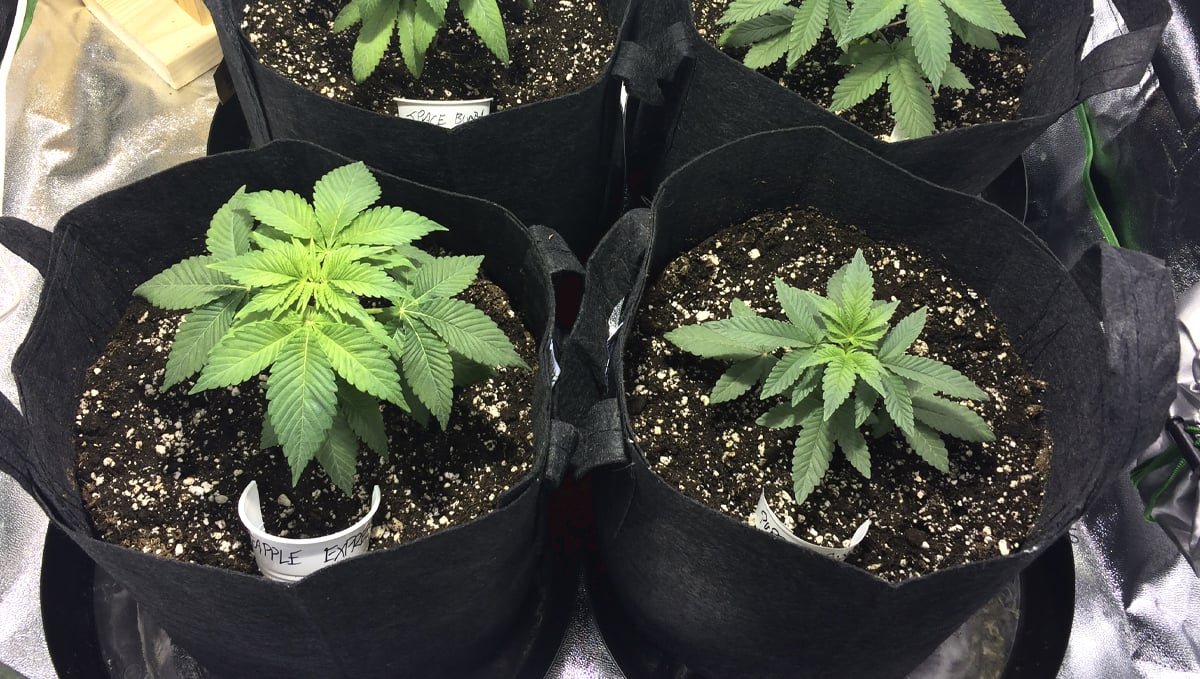
The only disadvantage is that smart pots are made out of fabric so the water can get everywhere when watering, we recommend you place a tarp to avoid getting your tent wet or a saucer to catch the water if you’re growing indoors.
Air pots
Just like smart pots, air pots provide a lot of oxygen for the roots to breathe as much as they need to, the only downside which isn't a big problem at all is they don't have handles to facilitate handling which can be useful if you have to move your pots around. As their name suggests, the many holes situated in the walls of these containers expose plant roots to direct contact with the air outside the pot. Plant roots detect the high concentration of air and effectively prune themselves. Instead of continuing to grow in a dense spiral—which can result in reduced nutrient and water uptake—the root tips come to a stop when they make contact with the air and send out smaller offshoots that are less prone to such detrimental tangling.
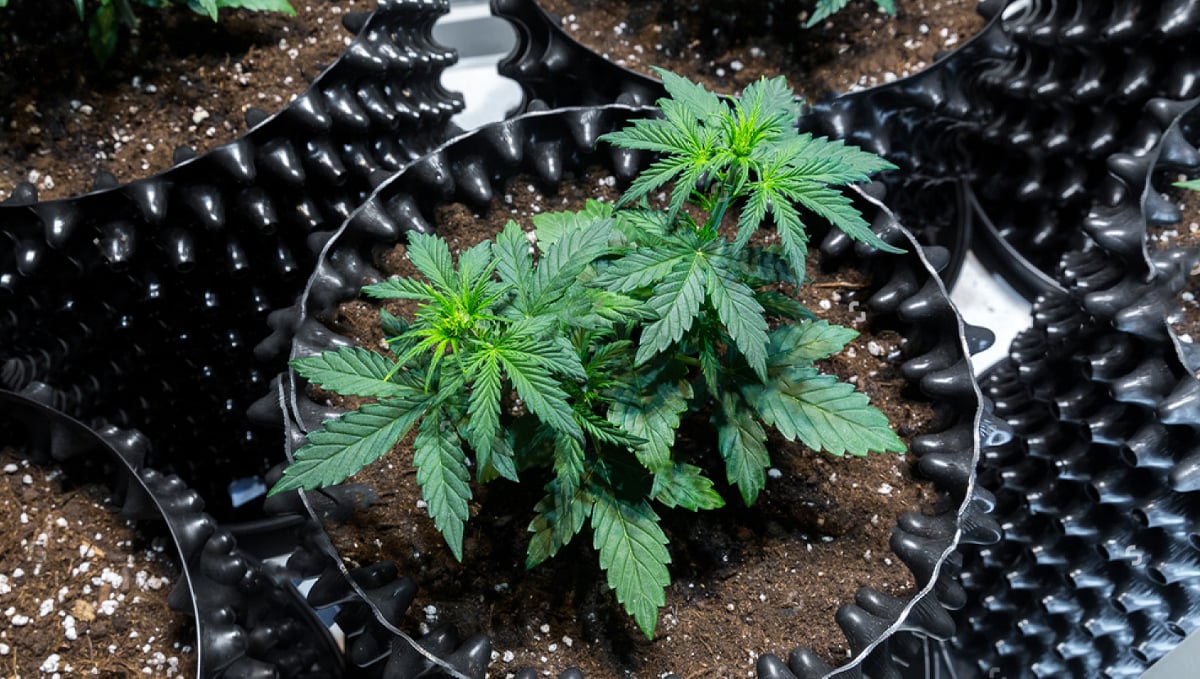
Air pots are made out of plastic and have several holes along the sides so you won’t have to worry about drainage or oxygenation but the downside is they can be a bit more expensive than regular pots, also, when growing in air pots the medium can dry a little bit faster so make sure you adjust the quantity and water properly.
3. Improvised pots
Growers on a budget cannot spend unless it’s extremely necessary, cannabis plants can be grown in any kind of container as long as it provides proper drainage and oxygen. Have in mind that sunlight should not reach the roots so it’s vital the improvised pot is not white or clear.
Paint buckets
Paint buckets are a good way to grow cannabis without spending too much because they can be found in almost any size, the only problem is that they do not contain holes for water drainage but you can easily make them yourself. However, if you own a drill, or you can get your hands on one, then you’re practically creating a plastic container. The only difference: They cost a lot less. Head to any plant nursery or garden center and you’ll find they often sell buckets for less than their plastic plant pots. Plus, most plastic pots for sale are either black or brown. If you live in a hot region, you can convert a white bucket into a pot that’ll reflect heat and stay cooler throughout the day.
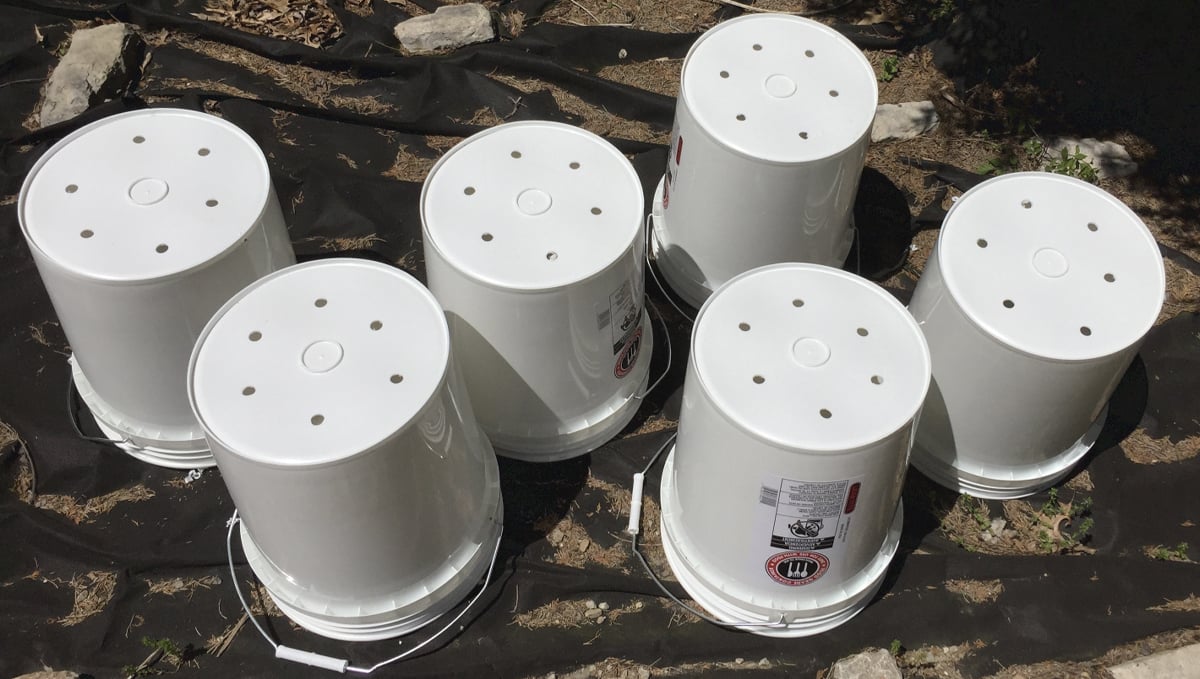
Another problem is that sometimes paint can contain lead which can be harmful if your plant ends up absorbing them so you have to make sure you thoroughly wash the bucket and there are no signs of paint left.
Bottles
Soda bottles can also be used for growing autos, although the size will have an influence on how tall they grow and sometimes can end up being root-bound. Make sure you also make small drainage holes so you don't drown your plants.
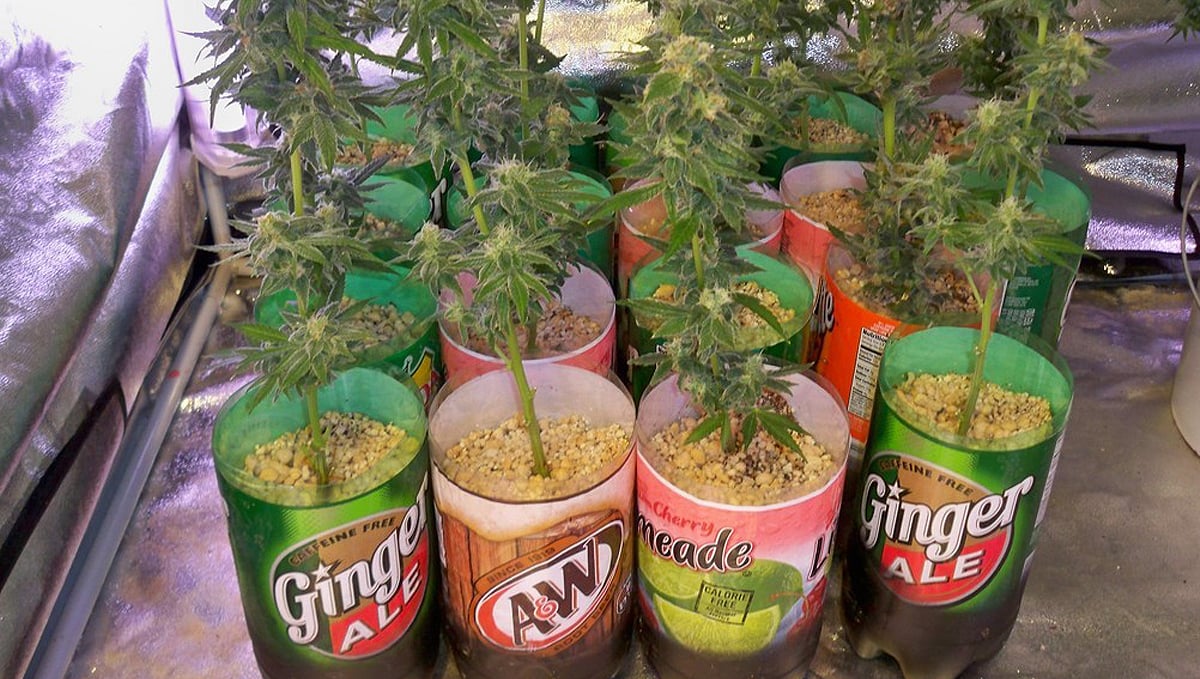
Because bottles are clear you’ll have to paint it black or cover the bottle with a black tarp but this can end up increasing the temperature in the medium so if you’re trying this, it’s recommended you check closely your plants' growth. Also, just like paint buckets, bottles don’t come with drainage holes so you will have to make them yourself.
Glass containers
Glass containers should be your last resource because it won’t be easy to make holes in it and there’s no easy way to paint them, even though autoflowers can be grown in glass vases we recommend staying away from them. This type of container can be quite expensive when compared to plastic pots so unless you cannot find or afford plastic pots (which are super cheap) then go for it but it’s more likely you’ll have a hard time through the grow cycle if you’re not an experienced grower.
4. What should you have in mind when buying pots?
When choosing which pot to buy, you should first have an estimate on how tall your autoflowers will grow to, knowing what to expect will avoid any problems such as root-bound plants or extremely short ones.
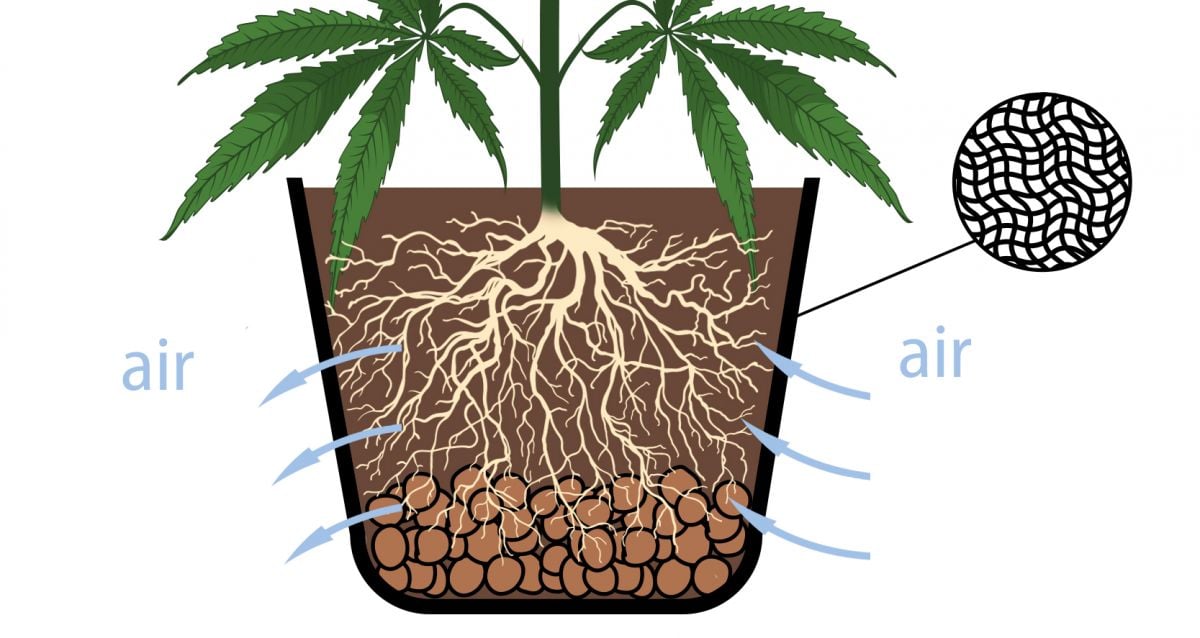
Another very important thing to remember is that autoflowers don’t do well when transplanted so you shouldn’t start in a smaller pot and then transplant it to a bigger one, we recommend starting in the final container so you avoid any possible problems.
You will see a huge difference between roots growing in a well-aerated damp medium and roots that are growing in a precarious medium.
Roots are the foundation to all plants, it’s essential to grow in pots with good drainage and proper oxygenation, don’t choose pots that dry fast or that will leave the roots swimming in water, you should aim for a damp medium.
5. Best pot for autoflowers
There isn’t such a thing as pots specially designed for autos, remember that even though automatic cannabis has the autoflowering trait, they’re still a plant and as long as your pot provides enough oxygen and drainage for the roots to grow properly, you’ll be fine growing any kind of plant, including autoflowering cannabis but that doesn't mean that there aren't better and worse options…
The Best Options for Autoflowers
So, there we have it - a full rundown of all the container options available right now for indoor and outdoor cannabis cultivation. And while each separate option comes with its own array of pros and cons, there are two options that stand out from the crowd.
Fabric Smart Pots
Our number one choice of autoflower cannabis containers is, without a doubt, fabric smart pots. While fabric smart pots have been used for over a decade throughout the wider horticulture industry, it is only in the last 5 years or so that we have seen them really make a big dent in the hobby or homegrowing cannabis cultivation sphere. But, go to any hydroponic supply store and ask "What pot type should I be using for my cannabis crop?" - the answer will be fabric smart pots almost 100% of the time.
Sure, they are a little more expensive than your everyday plastic planter, but not by much at all. Yes, there are some options out there that will cost an arm and a leg, but a quick amazon search also shows a bunch of affordable options. You can bag yourself a set of five 5-gallon fabric smart pots or ten 3-gallon pots for under $20 these days that offer all the same benefits as the more expensive options, while still offering all of the same benefits. Will they last as long? Maybe not, but they're not going to fall apart with the first year of use either. And at the price, your couch will most likely accumulate the spare change over the lifetime of the pots to cover the cost of a replacement set when the time comes.
The Main Benefits of Fabric Smart Pots
We have already gone into pretty deep detail further up, but let's quickly run through the main advantages in bullet form -
- Maximum root zone aeration - Smart pots are designed to allow maximum oxygen transfer, which is extremely important in autoflower cannabis cultivation.
- Root air pruning - While it may seem a little counter-intuitive, root pruning is actually a good thing. Not hands-on pruning though, air pruning. Smart pots are designed to encourage the tips of your cannabis plant's root system to dry out and die off, encouraging thick branching for maximum yields. remember, the bigger and healthier the root ball, the bigger and healthier the plant, the bigger and more potent the yield - simple.
- Maximum drainage - Excess moisture retention in the root zone can potentially cause a lot of harm to your cannabis crop, so choosing a container that offers high levels of drainage is super important. Smart pots provide the perfect environment for this, with a fabric design that allows drainage whilst still holding enough moisture to sustain your crop.
- Durable - Most fabric smart pots are extremely durable, with many lasting for several seasons before needing a replacement. Even the cheaper options are surprisingly hard-wearing, with many lasting for a full three to four seasons without any problems whatsoever.
- Easy to move - Hands down one of the best features of fabric smart pots is how lightweight and easy they are to move. They are much easier on the back than traditional plastic or terracotta pots, which makes them perfect for indoor gardeners with particularly large setups. No matter if you are growing indoors or under the sun, novice growers are often surprised at just how often they will need to move their pots. trust us, your future self will thank you for buying a container option that is lightweight, easy to move, and has inbuilt handles.
Do fabric smart pots come with any major downsides? Not really. They are a little more expensive than your everyday plastic container, so if you're on an extremely tight budget then you may want to opt for a cheaper option. But, you need to remember that with fabric smart pots, you are paying for quality. You will be saving money in the long run, as the pots will last much longer than a cheaper plastic option. If you are currently considering a new container for your grow setup, fabric smart pots are most likely the best choice. Not only will they offer you all of the benefits mentioned above, but they are also surprisingly affordable. So, why not take advantage of this amazing container - easy to find, cheap enough for every single cultivator no matter the budget, and the results are pretty ridiculous.
The Perfect Pot Size for Autoflowering Strains
Thanks to the fact that autos go from seed to harvest in 9 to 12 weeks - depending on the strain, style of cultivation, and environmental factors (along with a few separate points we won’t go into here) - the ideal size for a fabric smart pot is relatively small. In most cases, a 3 to 5-gallon option will work perfectly. That's around 11 to 15 liters for the metric system users amongst us. Although the ‘perfect’ size may vary slightly depending on your specific strain and cultivation method, this is a really good size to aim for when selecting your fabric smart pot.
Remember, autos are a little more delicate than photos in terms of stress management due to the fact that you only have about four weeks of vegetative growth. This means that we always recommended that you start your autoflowering stains in the pot you intend to harvest from. This cuts out any chance of transplant stress stunting growth.
7. In conclusion
Even though it may seem like the least important thing when growing cannabis, the pot is where you put the medium that the roots will grow in so it’s actually quite important, the medium is the environment where roots grow in and when put this way, it’s just as important as the environment where your plants grow in.
If you have DIY containers or other tips you’d like to share with fellow growers, please leave a comment in the comment section below!









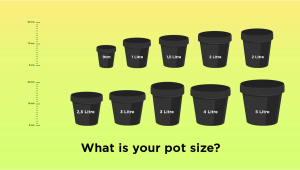

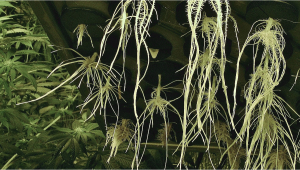

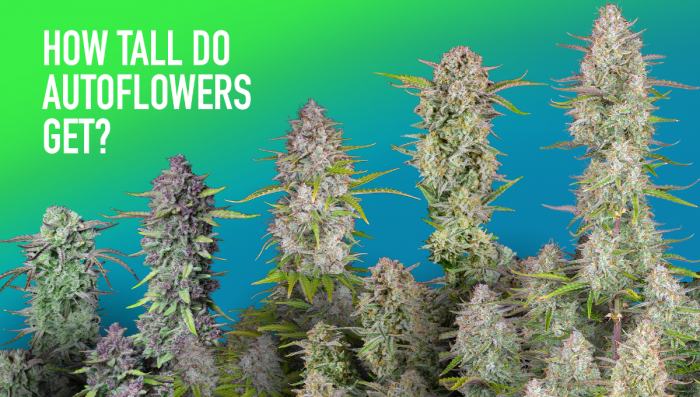
Comments